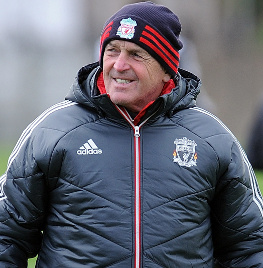Spain continue to dominate possession but need more penetration
A criticism of Spain days after an unfortunate 1-0 defeat to England is always likely to come across as a wild knee-jerk reaction, but Spain’s problems against decent sides have been evident for over a year now.
They were handed an extremely easy qualification group for Euro 2012 where they had few problems, but in friendlies with larger nations they’ve struggled. Since the World Cup, they’ve drawn 1-1 with Mexico, lost 4-1 to Argentina, lost 4-0 to Portugal, lost 2-1 to Italy and lost 1-0 to England. They went 2-0 down to Chile and came back to win 3-2 in the 91st minute. Granted, they’ve beaten the USA, Colombia and Venezuela (and won their qualification group at a canter), but the graph below shows how poor their results have been against sides in the top 40 according to the FIFA rankings, the type of side they’re likely to encounter at Euro 2012.
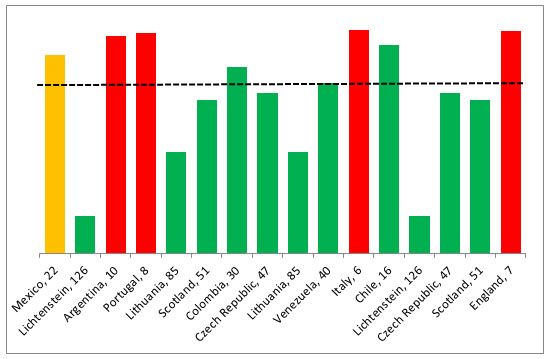 Using this (admittedly arbitrary) cut-off point, their record is P7 W2 D1 L4 F7 A14. This, for the World Champions and a side some consider one of the best of all-time, is an awful run. Spain take friendlies seriously and Vicente Del Bosque has hardly been putting out weakened sides – he’s rotated here and there, tried some new options, but Spain have so much strength in depth that even their second XI would contain world class players.
Using this (admittedly arbitrary) cut-off point, their record is P7 W2 D1 L4 F7 A14. This, for the World Champions and a side some consider one of the best of all-time, is an awful run. Spain take friendlies seriously and Vicente Del Bosque has hardly been putting out weakened sides – he’s rotated here and there, tried some new options, but Spain have so much strength in depth that even their second XI would contain world class players.
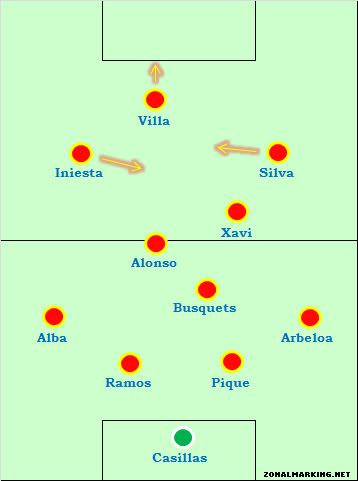 Selection
Selection
Del Bosque’s selection for the England game was concerning. He started with David Villa upfront, Andres Iniesta on the left and David Silva on the right. Using two wide players who like to come into the centre of the pitch has often looked bad for Spain under Del Bosque – they come inside, flood the centre of the pitch and make Spain too predictable, too narrow, and ultimately too easy to defend against.
That was the situation in the opening day defeat to Switzerland at the World Cup, when Spain were dreadful because of the sheer lack of width. This photo summed it up – the four attacking players all within a ten-yard square, no attacking threat at all from the flanks, and Switzerland able to defend very narrow and keep a clean sheet.
A slight change of shape was crucial to Spain’s World Cup win. Del Bosque realised he needed width, and after Jesus Navas had a good impact against the Swiss, Silva didn’t play another minute in the competition, with Iniesta the only wide player coming inside’ and a more direct player on the other flank – either Navas, Villa (played wide-left when Fernando Torres was upfront) or Pedro Rodriguez, who came in for the final two games. Spain now had more variety in their attack – one wide player contributed to the midfield dominance, the other provided forward runs and penetration, and stretched the opposition defence, creating gaps for the other players to play through.
Silva was the unfortunate victim of that Switzerland game. “When I was the only casualty of the defeat against Switzerland I thought it might be a state of fitness, but after criticism of my performances (it seems) the coach does not trust me,” he said recently. “Before that game I felt confident. I played regularly and had a place in the team, but after losing to Switzerland everything began to change. I was a victim of the poor debut that we had in the World Cup.”
His sudden disappearance was harsh on him individually, but it made sense for the sake of the side. Considering that the other man Del Bosque could have dropped, Iniesta, went onto have a key impact throughout the tournament, it’s hard to say that the manager’s decision was incorrect.
The first few minutes of the game against England saw the expected pattern – Silva and Iniesta coming inside, and England able to contain them comfortably by defending narrow.
Silva false nine
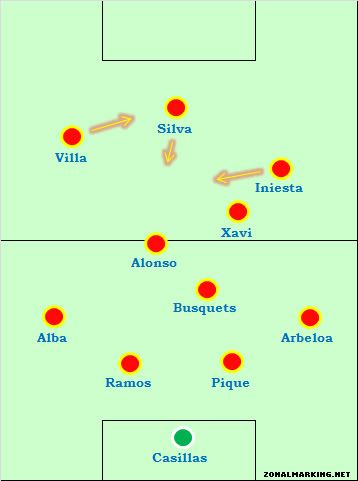 Midway through the first half, Del Bosque switched system and pushed Silva forward to be a false nine, Villa to the left and Iniesta to the right. Clearly, there’s a desire to try to create an appropriate replacement for Lionel Messi in a very Barcelona-centric national team, but false nines have yet to have success at international level.
Midway through the first half, Del Bosque switched system and pushed Silva forward to be a false nine, Villa to the left and Iniesta to the right. Clearly, there’s a desire to try to create an appropriate replacement for Lionel Messi in a very Barcelona-centric national team, but false nines have yet to have success at international level.
Argentina tried Messi in that role at the Copa America but fell back on the safety of a traditional nine later on, whilst Brazil wanted Pato (maybe not a false nine, but certainly not a traditional nine) as a lone striker but then turned to Fred when things went badly.
In theory, Silva as a false nine and a forward, Villa, on the left should have eased Spain’s problems with the two wide players coming into the middle, but in some ways it made it worse. With England sitting deep, Villa didn’t feel comfortable going in behind the right-back and instead cut into the middle of the pitch quickly. Iniesta also drifted in, and Silva naturally dropped deep.
Therefore, instead of having a striker looking for balls over the top and two wide players coming in, you had the striker and the wide players all drifting into a similar position. Spain had complete dominance of possession against England but barely created a chance in the first half.
Need for width
On the subject of a lack of width, two side points. First, the need for a more naturally wide player is even more paramount than at the World Cup, because there is less attacking threat from full-back. The left-back position is up for grabs – Jordi Alba fared well here but has a long way to go before becoming the force that the underrated Joan Capdevilla was, a player who could cross the ball very well.
On the other flank, Carles Puyol’s fitness concerns means that Sergio Ramos is often having to play as a centre-back, as he did here, which means Alvaro Arbeloa – a decent functional full-back rather than a buccaneering one – plays at right-back.
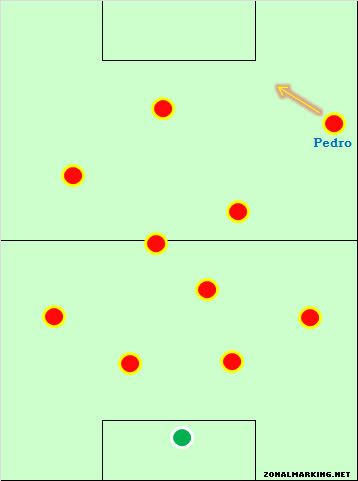 Second, Pedro Rodriguez was injured and not with the squad, which is a big problem for Spain. His importance to Spain’s system has been completely overlooked – as the only natural top-class wide forward Spain have, there is no real replacement when he’s out, a major issue considering he was the man who came in and completed the side during the World Cup. If Del Bosque wants to try to replicate a Barcelona-style system, Pedro is crucial. No other player understands Pep Guardiola’s system better than Pedro. “When I didn’t know which positions to take up last season,” Villa said, “I just watched Pedro and copied him.”
Second, Pedro Rodriguez was injured and not with the squad, which is a big problem for Spain. His importance to Spain’s system has been completely overlooked – as the only natural top-class wide forward Spain have, there is no real replacement when he’s out, a major issue considering he was the man who came in and completed the side during the World Cup. If Del Bosque wants to try to replicate a Barcelona-style system, Pedro is crucial. No other player understands Pep Guardiola’s system better than Pedro. “When I didn’t know which positions to take up last season,” Villa said, “I just watched Pedro and copied him.”
The qualities of other players can be replaced through injury – even far better players like Iniesta or Xavi – but Pedro’s attributes are largely unique within the Spain squad.
Fabregas
The other ‘outsider’ who turned out to be crucial at the World Cup was Cesc Fabregas, despite the fact he didn’t start a game. He brought driving runs from the centre of midfield which proved crucial in the quarter-final win over Paraguay and the final win against Holland. This is another quality that Spain lack elsewhere, and another potential answer to the problem of no penetration.
Fabregas has started his Barcelona career superbly, often playing just off the ‘false nine’ Messi. Their relationship is brilliant, and Fabregas has perfected what Tom Williams outlined as the ‘false ten’ role after last summer’s World Cup – providing the direct runs to exploit the space created by a false nine.
His appearance for the second half made sense, then – until you realised that he was replacing Silva and being asked to play the false nine role himself. There, Del Bosque appears to have completely missed what Fabregas brings to Spain – playing as a false nine you’re generally starting high up and coming towards the ball, when Spain need Fabregas going towards goal.
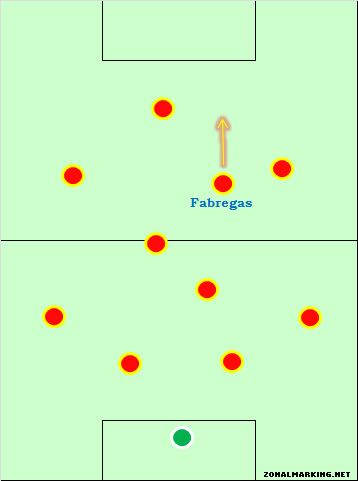 He can play as a false nine, but it’s not his best role, and he was at his most threatening when he dropped deeper and could then drive towards goal. In the final two minutes he had two shots - one after a cut-back from Torres that deflected into the arms of Joe Hart, the other from a low cross from Villa that Fabregas dragged past the far post when he should have scored. It was a terrible finish, but no other Spain player would have got into the position to miss it.
He can play as a false nine, but it’s not his best role, and he was at his most threatening when he dropped deeper and could then drive towards goal. In the final two minutes he had two shots - one after a cut-back from Torres that deflected into the arms of Joe Hart, the other from a low cross from Villa that Fabregas dragged past the far post when he should have scored. It was a terrible finish, but no other Spain player would have got into the position to miss it.
After Pedro and Fabregas, the third and final crucial player who ‘gives Spain something different’ is Fernando Llorente, who didn’t appear. When Spain wanted to go more direct, they introduced Torres – but the answer is surely Llorente, who was excellentagainst Portugal in the World Cup by providing an aerial threat upfront, and has done the same thing since – most obviously against Scotland.
Sid Lowe has (at the World Cup) very reasonably defended Torres’ place in the Spain side by saying he often plays ‘the Heskey role’ but Torres has been out of form for two years, and if you’re looking for a Heskey figure, it’s Llorente rather than Torres.
Conclusion
Football in 2011 is largely based around possession play in the midfield, and Spain have the best selection of midfielders in the world and also the most blatant commitment to passing football. That will not change based upon the results of a few friendlies. “We know that’s our way of playing, regardless of the score,” says Xabi Alonso, probably their most intelligent and articulate footballer. ”It’s very well defined, we have the right players and the right mentality…success convinced us that it is the right way forward. The past doesn’t count in terms of results but in terms of approach it does. It doesn’t mean we’ll win in the future but we know how we’ll try to win.”
Yet such a fierce commitment to a footballing ideology can hamper efficiency, and Del Bosque needs variety in the attacking positions. No-one is calling for Spain to abandon their philosophy and play like Stoke, but passing quality must be combined with penetration and direct running. That’s why they won the World Cup – because they had great quality in build-up play and combined it with some immediacy in the final third with the use of Pedro, Fabregas or Llorente.
Del Bosque can’t have forgotten the Switzerland game, and it’s not unreasonable to suggest that he simply has too many great passers that he feels deserve a chance. If Xavi Hernandez, Xabi Alonso and Sergio Busquets are the first choice three in the middle, it leaves other ‘passers’ Silva, Iniesta, Juan Mata and Santi Cazorla battling for the three places ahead. But in stylistic terms, as outlined above, it should probably only be one place they’re battling for…the other two spots must be freed up for more direct players. The more pure ‘passers’ they play, the more the opposition will sit deep and narrow, and the more Spain will need (a) driving midfield runs, (b) wing play or (c) a strong centre-forward to get the breakthrough.
They were handed an extremely easy qualification group for Euro 2012 where they had few problems, but in friendlies with larger nations they’ve struggled. Since the World Cup, they’ve drawn 1-1 with Mexico, lost 4-1 to Argentina, lost 4-0 to Portugal, lost 2-1 to Italy and lost 1-0 to England. They went 2-0 down to Chile and came back to win 3-2 in the 91st minute. Granted, they’ve beaten the USA, Colombia and Venezuela (and won their qualification group at a canter), but the graph below shows how poor their results have been against sides in the top 40 according to the FIFA rankings, the type of side they’re likely to encounter at Euro 2012.

The relative strength of Spain's opponents since the World Cup - the higher the bar, the higher their world ranking (as of now). Green bars indicate a Spain victory, red indicates a defeat, orange indicates a draw. The countries above the dotted line indicates they're in the top 40 in the FIFA rankings.

The starting line-ups for the England game. The midfield three was fluid - Busquets often ended up ahead of Alonso.
Del Bosque’s selection for the England game was concerning. He started with David Villa upfront, Andres Iniesta on the left and David Silva on the right. Using two wide players who like to come into the centre of the pitch has often looked bad for Spain under Del Bosque – they come inside, flood the centre of the pitch and make Spain too predictable, too narrow, and ultimately too easy to defend against.
That was the situation in the opening day defeat to Switzerland at the World Cup, when Spain were dreadful because of the sheer lack of width. This photo summed it up – the four attacking players all within a ten-yard square, no attacking threat at all from the flanks, and Switzerland able to defend very narrow and keep a clean sheet.
A slight change of shape was crucial to Spain’s World Cup win. Del Bosque realised he needed width, and after Jesus Navas had a good impact against the Swiss, Silva didn’t play another minute in the competition, with Iniesta the only wide player coming inside’ and a more direct player on the other flank – either Navas, Villa (played wide-left when Fernando Torres was upfront) or Pedro Rodriguez, who came in for the final two games. Spain now had more variety in their attack – one wide player contributed to the midfield dominance, the other provided forward runs and penetration, and stretched the opposition defence, creating gaps for the other players to play through.
Silva was the unfortunate victim of that Switzerland game. “When I was the only casualty of the defeat against Switzerland I thought it might be a state of fitness, but after criticism of my performances (it seems) the coach does not trust me,” he said recently. “Before that game I felt confident. I played regularly and had a place in the team, but after losing to Switzerland everything began to change. I was a victim of the poor debut that we had in the World Cup.”
His sudden disappearance was harsh on him individually, but it made sense for the sake of the side. Considering that the other man Del Bosque could have dropped, Iniesta, went onto have a key impact throughout the tournament, it’s hard to say that the manager’s decision was incorrect.
The first few minutes of the game against England saw the expected pattern – Silva and Iniesta coming inside, and England able to contain them comfortably by defending narrow.
Silva false nine

Midway through the first half, David Silva became a false nine
Argentina tried Messi in that role at the Copa America but fell back on the safety of a traditional nine later on, whilst Brazil wanted Pato (maybe not a false nine, but certainly not a traditional nine) as a lone striker but then turned to Fred when things went badly.
In theory, Silva as a false nine and a forward, Villa, on the left should have eased Spain’s problems with the two wide players coming into the middle, but in some ways it made it worse. With England sitting deep, Villa didn’t feel comfortable going in behind the right-back and instead cut into the middle of the pitch quickly. Iniesta also drifted in, and Silva naturally dropped deep.
Therefore, instead of having a striker looking for balls over the top and two wide players coming in, you had the striker and the wide players all drifting into a similar position. Spain had complete dominance of possession against England but barely created a chance in the first half.
Need for width
On the subject of a lack of width, two side points. First, the need for a more naturally wide player is even more paramount than at the World Cup, because there is less attacking threat from full-back. The left-back position is up for grabs – Jordi Alba fared well here but has a long way to go before becoming the force that the underrated Joan Capdevilla was, a player who could cross the ball very well.
On the other flank, Carles Puyol’s fitness concerns means that Sergio Ramos is often having to play as a centre-back, as he did here, which means Alvaro Arbeloa – a decent functional full-back rather than a buccaneering one – plays at right-back.

Pedro's theoretical role for Spain
The qualities of other players can be replaced through injury – even far better players like Iniesta or Xavi – but Pedro’s attributes are largely unique within the Spain squad.
Fabregas
The other ‘outsider’ who turned out to be crucial at the World Cup was Cesc Fabregas, despite the fact he didn’t start a game. He brought driving runs from the centre of midfield which proved crucial in the quarter-final win over Paraguay and the final win against Holland. This is another quality that Spain lack elsewhere, and another potential answer to the problem of no penetration.
Fabregas has started his Barcelona career superbly, often playing just off the ‘false nine’ Messi. Their relationship is brilliant, and Fabregas has perfected what Tom Williams outlined as the ‘false ten’ role after last summer’s World Cup – providing the direct runs to exploit the space created by a false nine.
His appearance for the second half made sense, then – until you realised that he was replacing Silva and being asked to play the false nine role himself. There, Del Bosque appears to have completely missed what Fabregas brings to Spain – playing as a false nine you’re generally starting high up and coming towards the ball, when Spain need Fabregas going towards goal.

Fabregas' natural role
After Pedro and Fabregas, the third and final crucial player who ‘gives Spain something different’ is Fernando Llorente, who didn’t appear. When Spain wanted to go more direct, they introduced Torres – but the answer is surely Llorente, who was excellentagainst Portugal in the World Cup by providing an aerial threat upfront, and has done the same thing since – most obviously against Scotland.
Sid Lowe has (at the World Cup) very reasonably defended Torres’ place in the Spain side by saying he often plays ‘the Heskey role’ but Torres has been out of form for two years, and if you’re looking for a Heskey figure, it’s Llorente rather than Torres.
Conclusion
Football in 2011 is largely based around possession play in the midfield, and Spain have the best selection of midfielders in the world and also the most blatant commitment to passing football. That will not change based upon the results of a few friendlies. “We know that’s our way of playing, regardless of the score,” says Xabi Alonso, probably their most intelligent and articulate footballer. ”It’s very well defined, we have the right players and the right mentality…success convinced us that it is the right way forward. The past doesn’t count in terms of results but in terms of approach it does. It doesn’t mean we’ll win in the future but we know how we’ll try to win.”
Yet such a fierce commitment to a footballing ideology can hamper efficiency, and Del Bosque needs variety in the attacking positions. No-one is calling for Spain to abandon their philosophy and play like Stoke, but passing quality must be combined with penetration and direct running. That’s why they won the World Cup – because they had great quality in build-up play and combined it with some immediacy in the final third with the use of Pedro, Fabregas or Llorente.
Del Bosque can’t have forgotten the Switzerland game, and it’s not unreasonable to suggest that he simply has too many great passers that he feels deserve a chance. If Xavi Hernandez, Xabi Alonso and Sergio Busquets are the first choice three in the middle, it leaves other ‘passers’ Silva, Iniesta, Juan Mata and Santi Cazorla battling for the three places ahead. But in stylistic terms, as outlined above, it should probably only be one place they’re battling for…the other two spots must be freed up for more direct players. The more pure ‘passers’ they play, the more the opposition will sit deep and narrow, and the more Spain will need (a) driving midfield runs, (b) wing play or (c) a strong centre-forward to get the breakthrough.



